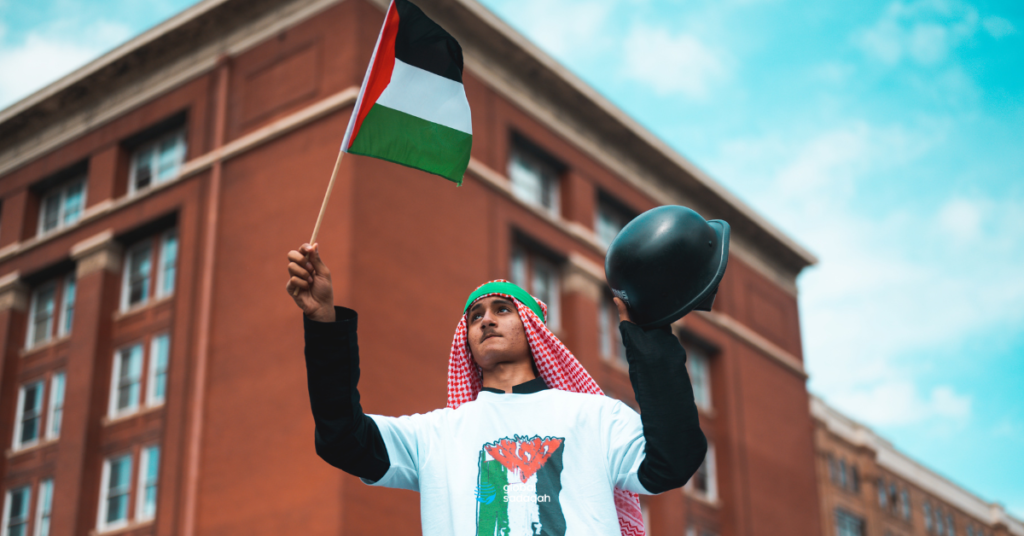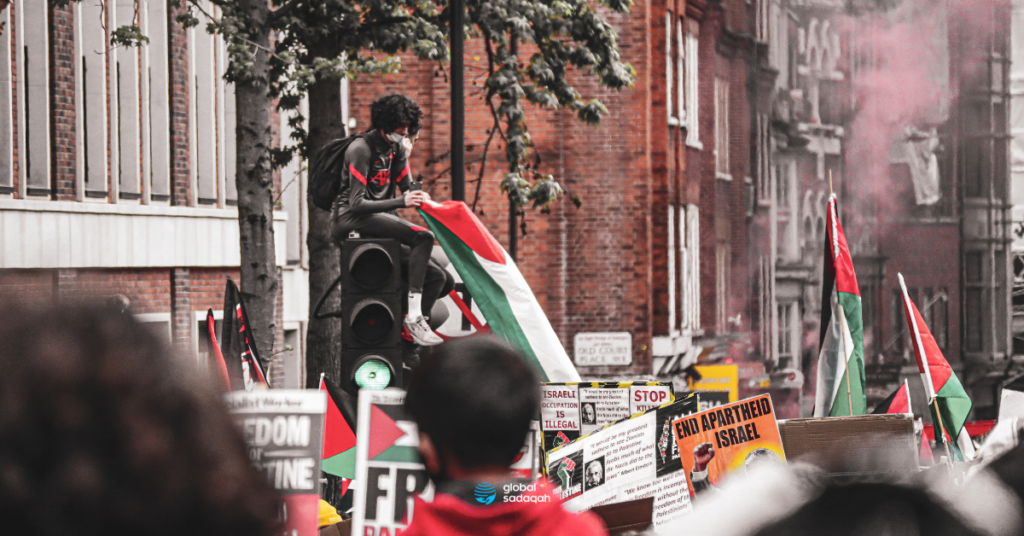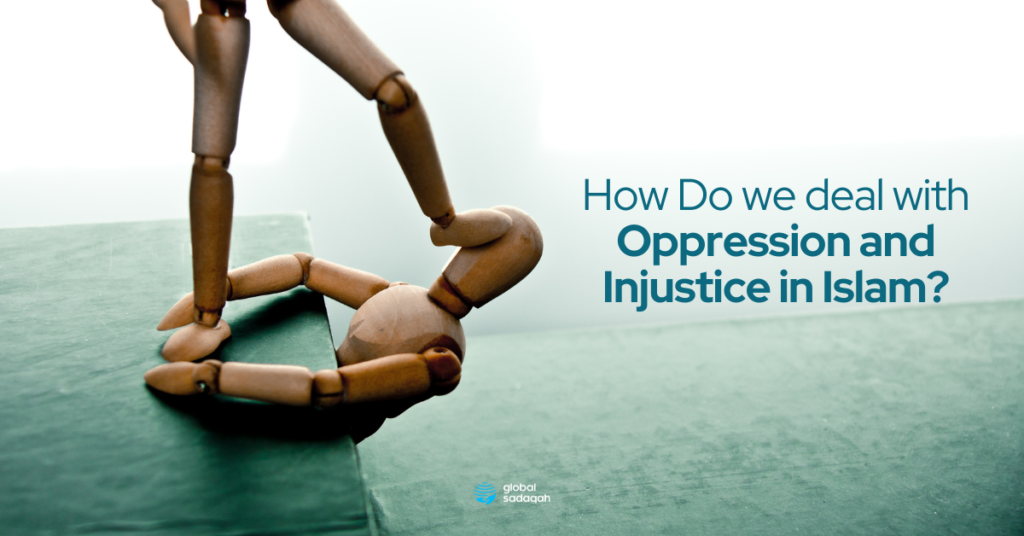We consistently are seeing realities of injustice and oppression through the media and maybe even in our own lives.
We’re living in in this world of technology which has its benefits but more and more of us are realising that we have actually become desensitised to themes of oppression – seeing children in poverty and seeing mothers who are unable to give their children food or civil unrest across the world – because every single day these images strike our eyes and we have become numb to the realities of such things.
Nonetheless, once in a while we often think about the ramifications of widespread oppression in its various forms, and what it means to have to deal with such injustice as a Muslim living in the modern world.
What constitutes oppression?

The standard definition of oppression can be described as the cruel, or unfair exercise of authority or power, an act or occurrence of oppression, or being made the subject of cruel or unfair demands or restrictions.
This is a clear concept to grasp, although sometimes it can be difficult to identify oppression in its many forms, from relationships and socio-political scenarios to corruption. For instance, there may be political parties that leverage policies that are excessively restrictive to one group or race.
There are powerful figures and authorities around the world that add to the pressures and suffering of particular subjects due to a plethora of reasons and justifications. Even domestic cases that involve abuse or violence may constitute oppression or injustice.
Related: 10 Tips for Strengthening the Iman in Times of Hardship
Fighting back against oppression

Islam is often considered to be a religion of peace, good will, understanding, and good faith. However, true followers of Islam will regard fighting back for the sake of honour, justice, and the religion they regard as sacred. The Prophet’s life (ﷺ) serves as an example of heroic virtue paired with selfless compassion and love, which is his ideal.
They value bravery, submission, discipline, duty, and a persistent effort to uphold truth and morality using all available resources, including those of the physical, moral, intellectual, and spiritual nature.
They are aware that war is wicked, but they will not hesitate to retaliate if their honour requires it and a just Imam – such as Muhammad (ﷺ) was without equal – orders it since they will then be certain that they are not pursuing materialistic goals. Other times, their faith has nothing to do with conflict other than the fact that it will always be governed by its compassionate principles.
On another note, Muslims can be mindful of the oppression that can be observed around them and whenever possible, fight back against such malicious acts. One can use words and intellect, or push for justice through the legal system if it is feasible. All these practices may be considered as fighting against oppression.
When Muslims commit wrongdoing

When injustice is encountered, it’s normal to feel angry and outraged. We are obviously even more incensed when the injustice is directed at our fellow Muslims. However, occasionally we find Muslims breaking the law.
When injustice and oppression take place so close to home, whether it is in the context of our immediate family, local community, or on a worldwide scale, we often feel rattled and betrayed.
We demand justice and hope that those responsible are brought to justice. When the authorities handle a problem properly, we are fortunate to get closure, but other times justice eludes us, whether due to a trusted institution’s systemic failure or for some other reason.
Sometimes we feel that no matter what happens, true forgiveness can never happen since the offender is so close to us and so highly respected by us. Yet, it is important that we strive for forgiveness and mercy as part of the collection of ideals held so strongly in Islam.
Allah’s Apostle (ﷺ) said, “Help your brother, whether he is an oppressor or he is an oppressed one. People asked, “O Allah’s Apostle! It is all right to help him if he is oppressed, but how should we help him if he is an oppressor?” The Prophet (ﷺ) said, “By preventing him from oppressing others.” [Bukhari]
Related: Focusing on the power of repentance in Islam
The powerful supplication of the oppressed

Islam was revealed to safeguard all people’s inherent rights, including their unalienable rights to life, property, and freedom. It is a grave sin to violate these rights without justification, and Muslims who assert that the Quran and Sunnah support such injustice are betraying Islam.
The fact that Allah would always respond to the supplication of an oppressed individual is one of the reasons we should be wary of injustice.
“Beware of the supplication of the oppressed, for there is no veil between it and Allah.” [Bukhari]
It is worth noting that those of us who fear Allah must remember this simple fact that supplication from those we may oppress is indeed potent, and so we should be very mindful of how we treat others. On the other hand, oppressors will have to tend to the many potential wrongdoings they have done in the hereafter.
Act with integrity against oppression
All of us have a right to justice, but it is important to remember two things while pursuing it: first, we cannot use the pursuit of justice as a justification for breaking the sacred law, and second, true justice in Allah’s eyes goes beyond this world and is ultimately carried out on the Day of Judgement.
While the vast majority of people can be grateful that no one is currently in immediate danger of losing their lives, the Prophet’s (ﷺ) counsel to “be like the better of Adam’s two sons” (referring to Qabil and Habil) is still applicable when we are harmed. His comments are a reminder to us to act with integrity in all of our dealings and to uphold the sacred law’s precepts no matter what circumstance we find ourselves in.
Allah gives us guidance in the Quran on how to respond to injustice.
“And surely we will try you with something of fear, hunger, and loss of wealth, life, and the fruits [of your labour]; but give glad tidings to those who have patience, who, when assailed by adversity, say, ‘Surely we belong to God, and to Him we shall return.’” [Surah Al Baqarah, 155-156].
Islam is unique in its teachings of fighting against injustices while remaining true and gentle in accordance to the religious values. As Muslims, it is important for us to live with a sense of awareness of the wrongdoings of others and to accept that oppression is part of the series of tests we may encounter. Yet at the same time, it may also be a worthy cause to act against oppression wherever possible.

